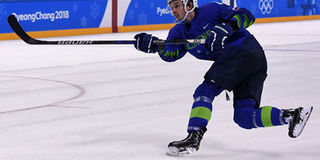Slovenian Olympic hockey player fails drug test: CAS

In this photo taken on February 17, 2018 Slovenia's Ziga Jeglic scores the game-winning goal against Slovakia during a penalty-shot shootout in their men's preliminary round ice hockey match during the Pyeongchang 2018 Winter Olympic Games at the Kwandong Hockey Centre in Gangneung. PHOTO | JUNG YEON-JE |
What you need to know:
- Slovenian ice hockey player Ziga Jeglic failed a drugs test and has been kicked out of the Pyeongchang Winter Olympics, the Court of Arbitration for Sport (CAS) said Tuesday, becoming the third doping case to roil the Games.
- The 29-year-old Jeglic had been suspended and ordered to leave the Olympic Village within 24 hours after testing positive for the banned drug fenoterol, which is used to treat breathing difficulties, CAS said in a statement.
- CAS said Jeglic "accepted an anti-doping rule violation and, as a consequence, the athlete is suspended from competing in the remainder of the Olympic Winter Games Pyeongchang 2018."
PYEONGCHANG
Slovenian ice hockey player Ziga Jeglic failed a drugs test and has been kicked out of the Pyeongchang Winter Olympics, the Court of Arbitration for Sport (CAS) said Tuesday, becoming the third doping case to roil the Games.
The 29-year-old Jeglic had been suspended and ordered to leave the Olympic Village within 24 hours after testing positive for the banned drug fenoterol, which is used to treat breathing difficulties, CAS said in a statement.
CAS said Jeglic "accepted an anti-doping rule violation and, as a consequence, the athlete is suspended from competing in the remainder of the Olympic Winter Games Pyeongchang 2018."
Jeglic is a forward who plays his club hockey in the Kontinental Hockey League for Russian side Neftekhimik Nizhnekamsk.
It comes just a day after a medal-winning Russian curler who passed rigorous vetting to attend the Winter Olympics in South Korea was hit by a drugs case.
Alexander Krushelnitsky, who won bronze in the mixed doubles curling with his wife Anastasia Bryzgalova, was also the subject of a procedure at the anti-doping division of CAS, which handles doping cases during the Games.
That case could have wider repercussions: Olympic officials will decide this week whether to lift a ban on Russia and let them march behind their national flag at the closing ceremony on Sunday.
A source close to the matter told AFP that case involves meldonium, which increases endurance and helps recovery.
Russia were banned as a team from the Olympics in December after investigations revealed an extensive doping plot culminating at the Sochi 2014 Winter Games, where the hosts topped the medals table
But 168 Russian athletes declared clean after extensive checking were allowed to compete in Pyeongchang as neutrals, under the banner of "Olympic Athletes from Russia".
Last week, Japanese short-track speed skater Kei Saito vowed to clear his name after testing positive for a banned substance in the first doping case at the Pyeongchang Olympics.
Saito was the first Japanese to test positive at a Winter Olympics and he was immediately thrown out of the Games on Monday last week.
Saito returned positive tests for acetazolamide, an unauthorised diuretic which can be used to mask powerful performance-enhancing drugs.
Saito said he was innocent of any wrongdoing and said that he had been tested prior to the Games, on January 29, and been found to be drug-free.





